More Americans Say Campus Protests Driven by Anger With Israel Than by Antisemitism
A partisan divide remains—in contrast with Democrats and independents, more Republicans see antisemitic attitudes behind the protests than anger with Israeli actions.
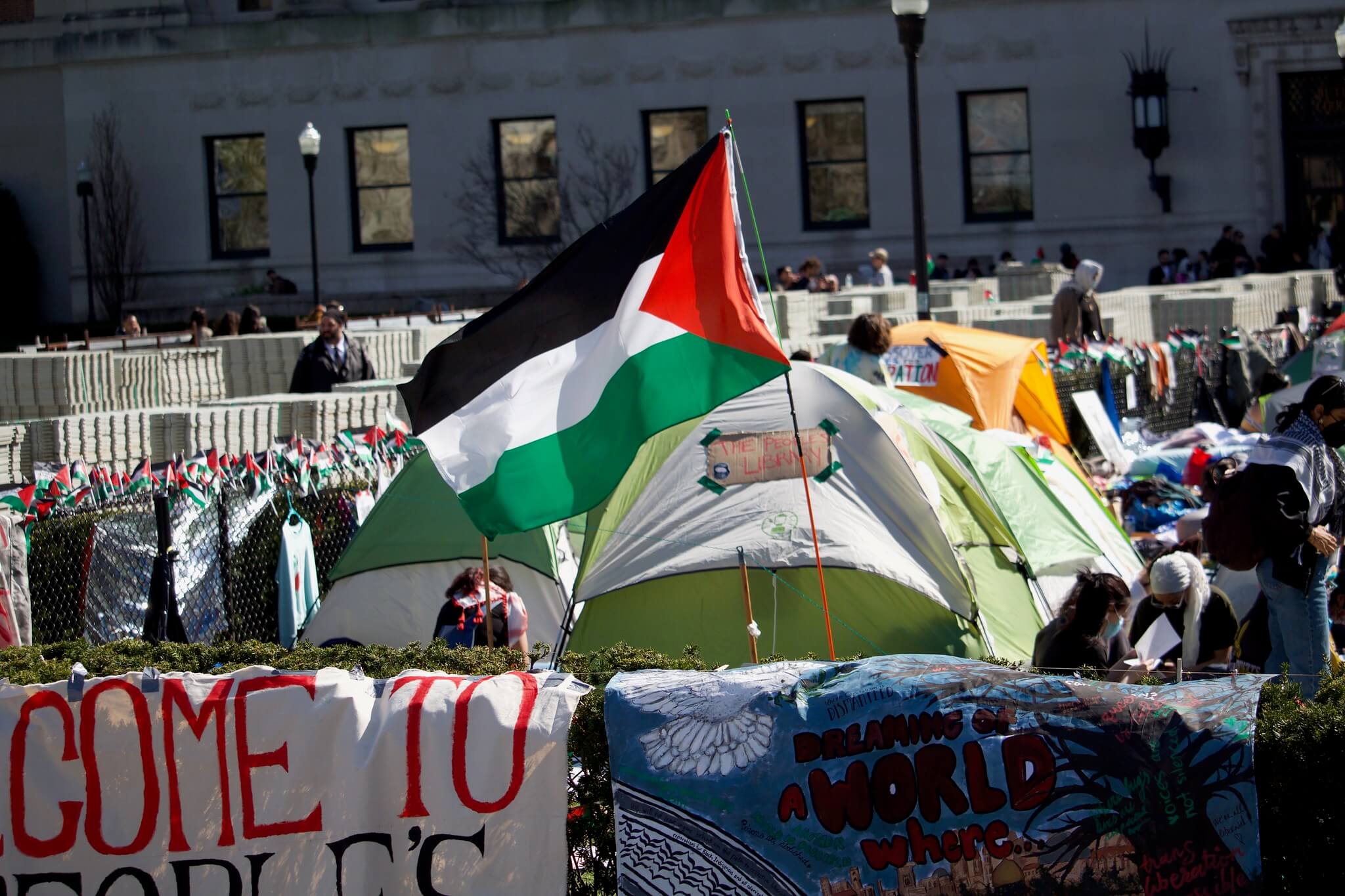
Many of the Trump administration’s high-profile actions against American universities share something in common: accusations of antisemitism. In a recent Truth Social post, President Trump said he was “considering taking Three Billion Dollars of Grant Money away from a very antisemitic Harvard.” Examples go beyond the president’s social media feed. In March, the U.S. Department of Health and Human Services, U.S. Department of Education, and U.S. General Services Administration announced “a comprehensive review of Columbia University’s federal contracts and grants,” with the goal of combating antisemitism.
In April, I probed American public perceptions of why the Trump administration is targeting universities, finding that most Americans say the aim of the administration is to confront its critics or critics of Israel, rather than to confront antisemitism.
But are Americans’ perceptions of what’s driving the Trump administration’s actions partly a function of how Americans view the campus protests? What do Americans say is driving these protests in the first place? Our latest round of the University of Maryland Critical Issues Poll (CIP), which I direct, probed that related question. The CIP has for years surveyed Americans on critical international and domestic issues of the day, including prejudice against Jews, Muslims, and other groups in America, as well as campus-related issues, especially after Hamas’s attack on Israel in 2003, and Israel’s subsequent war in Gaza.
Results from the latest survey, which included a sample of 1,008 respondents surveyed from May 2 to May 5, show that more Americans see the campus protests as being driven by anger with Israeli actions than by antisemitic attitudes, although about one-third of Americans have no opinion on the matter. There remains a partisan divide where, in contrast with Democrats and independents, more Republicans see attitudes of antisemitism behind the protests than anger with Israeli actions.
Notably, however, Republicans aged 18 to 34, unlike older Republicans, see anger with Israel as a bigger driver of protests than antisemitism. In fact, the gap between younger and older Republicans on this issue is more than twice as large as the national gap between younger and older Americans.
Breaking Down Key Findings
First, more Americans say the campus protests reflect anger with Israeli actions in Gaza than say the protests reflect antisemitic attitudes. Not surprisingly, a large proportion, 37 percent, say they do not know. At the same time, 38 percent say the protests “are more reflective of anger with Israeli actions” than “reflective of antisemitic attitudes” (25 percent). There are notable differences along party lines. A majority of Democrats (55 percent) and a plurality of independents (42 percent) say protests reflect anger with Israeli actions, compared to 21 percent of Republicans who said the same. A plurality of Republicans (47 percent) says the protests are more reflective of antisemitic attitudes, whereas only 13 percent of Democrats and 18 percent of independents say the same.
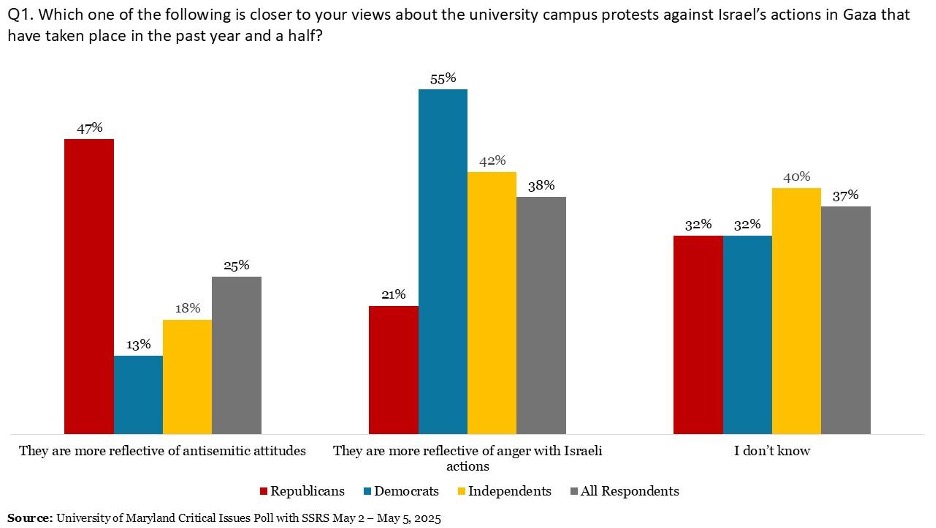
Second, Americans between 18 and 34 years old tend to say that the protests are more reflective of anger with Israeli actions (43 percent) than Americans 35 years and up (36 percent). But the most striking difference is between younger and older Republicans: Whereas 53 percent of older Republicans say protests are more reflective of antisemitic attitudes, only 25 percent of younger Republicans say the same; and whereas 18 percent of older Republicans say protests are more reflective of anger with Israeli actions, 31 percent of younger Republicans say the same.
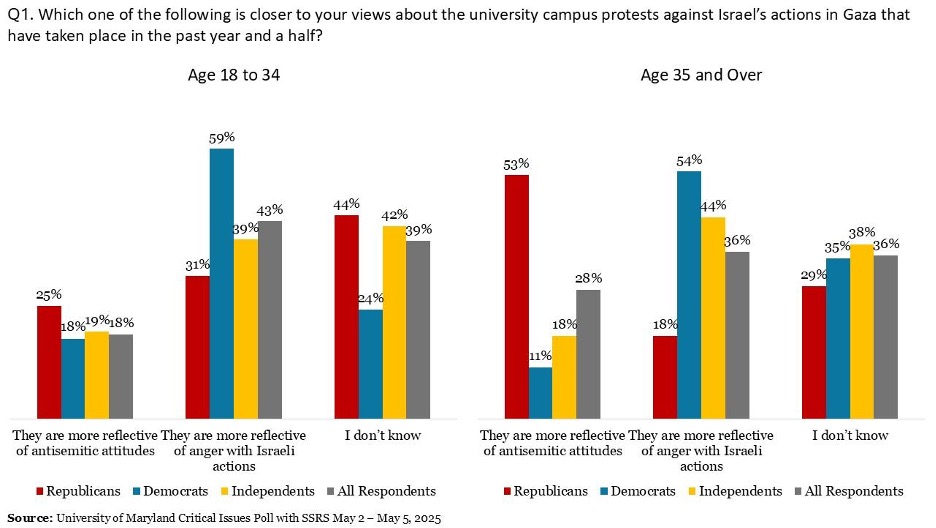
Third, in reaction to the measures taken by the Trump administration toward universities over the protests, more people say they feel “more sympathetic” with the protesters (30 percent) than with the critics of protesters (20 percent), while 35 percent of respondents say their views were not affected. The partisan divide was large: A majority of Democrats (56 percent) say the Trump administration’s actions have made them “more sympathetic with protesters” whereas 29 percent of independents and only 8 percent of Republicans say the same. A plurality of Republicans (44 percent) say their feelings were not affected while 40 percent report feeling more sympathetic with the critics of protesters. Only 8 percent of Democrats and 13 percent of independents say the Trump administration’s actions made them “more sympathetic with critics of protesters.”
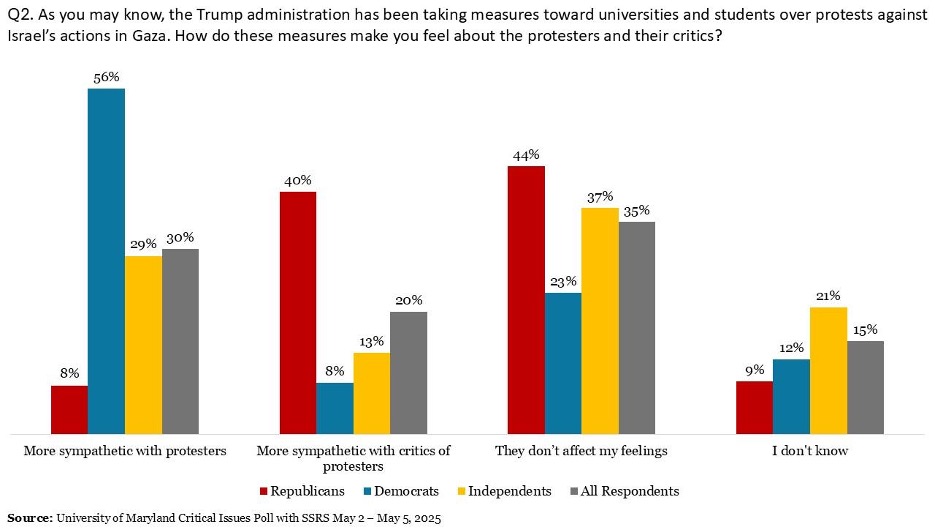
Fourth, Trump administration actions make younger Americans feel more sympathy with the protesters than with the critics of protesters by wider margins (24 percentage points) than older Americans (6 points).
The attitudes of younger Republicans were notable. The gap narrows among younger Republicans who say the Trump administration’s measures made them more sympathetic with protesters and more sympathetic with critics of protesters (17 percentage points) compared with older Republicans (35 percentage points), but does not change the overall direction, as more young Republicans (30 percent) say they are more sympathetic with critics of protesters than with protesters (13 percent).
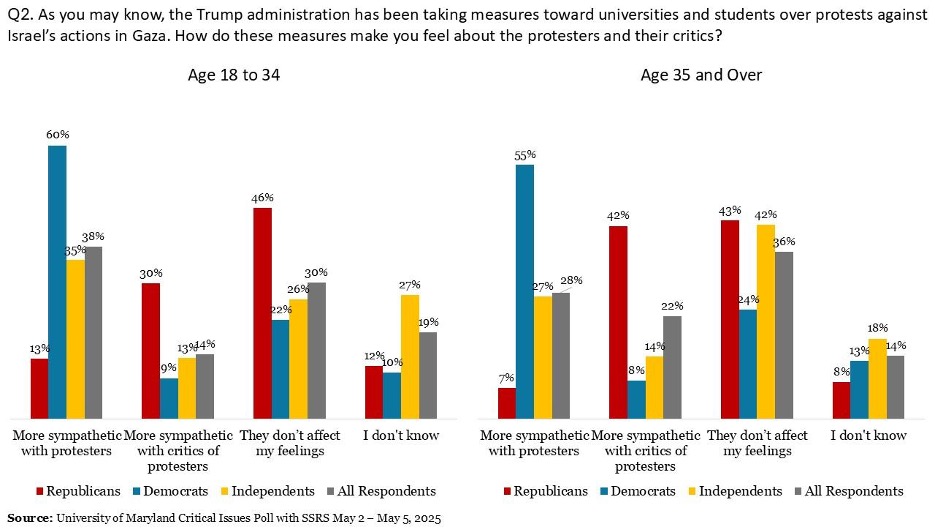
Methodological Experiment
Because the first and second questions potentially impact each other, we randomized the order, and the results above reflect the randomized total. We also probed the question of the impact that changing the order of these questions has on the responses. What we found vindicates the decision to randomize the order.
When respondents were asked whether the campus protests were more reflective of antisemitic attitudes or anger with Israeli actions prior to being asked about the Trump administration’s actions, more respondents (28 percent compared to 23 percent) including more Republicans (52 percent compared to 43 percent) and more Democrats (17 percent compared to 8 percent) said the protests were more reflective of antisemitic attitudes than when the questions were asked in the opposite order. Fewer respondents (32 percent compared to 44 percent), including 8 percent fewer Democrats and 18 percent fewer Republicans, said the protests reflected anger with Israeli actions when Question 1 was asked first than when Question 2 was asked first.
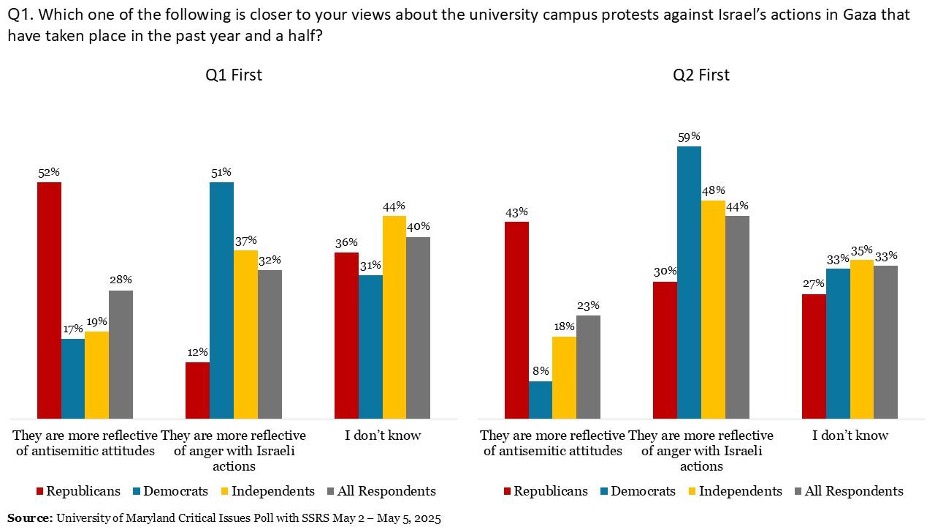
When respondents were asked how the Trump administration’s actions made them feel prior to being asked about their views of whether the protests reflect antisemitic attitudes or anger with Israeli action, more respondents (32 percent compared to 29 percent) and a larger majority of Democrats (62 percent compared to 51 percent) say they had more sympathy for the protesters. At the same time, more Republicans (42 percent compared to 37 percent) say they were more sympathetic with critics of protesters, and more independents (41 percent compared to 33 percent) say their feelings were unaffected.
It is also notable that starting with Question 2 significantly reduces the number of respondents who say they don’t know the answers to both questions, perhaps suggesting that invoking President Trump’s position first guides both his supporters and his critics into firmer positions.
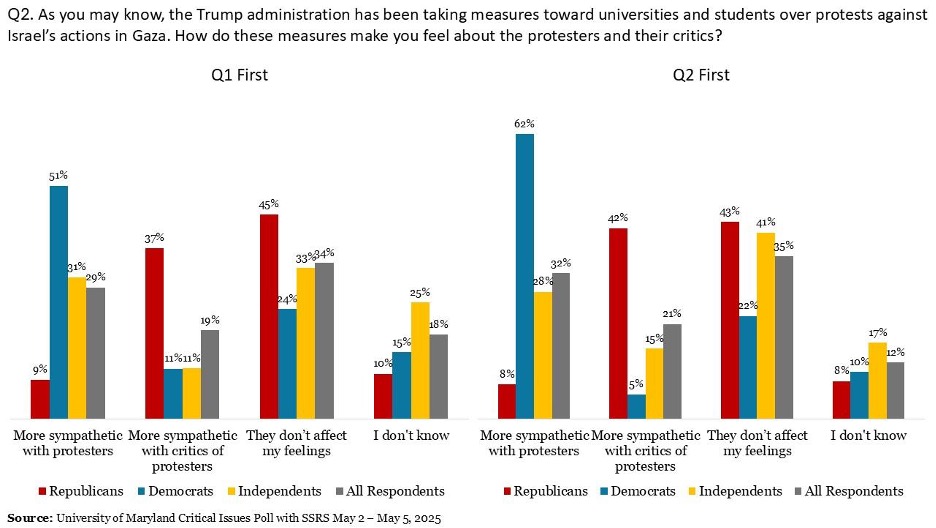
One possible reason for these differences is the Trump factor: Starting with information about the Trump administration’s position (entailed in Question 2) adds to the polarization on both questions among Democrats and Republicans but also adds to sympathy with protesters overall. This interpretation is bolstered by our April poll showing that Democrats and Republicans are divided on what drives the Trump administration’s actions toward universities but that, overall, most Americans saw these actions as being driven more by going after political critics and critics of Israel than by confronting antisemitism.
***
In reaction to the Trump administration’s actions toward universities over the campus protests, more Americans express increased support for the protesters than increased support for the critics of the protesters. This finding could be a function of the assessment that the protests were caused more by anger with Israel than by antisemitism, as well as by our finding in April that more Americans see the Trump administration’s actions themselves as being motivated more by confronting critics of Israel than by confronting antisemitism.


-1928c983-394b-444d-b1ec-f6590b7d9fee.jpeg?sfvrsn=78498e1e_7)


